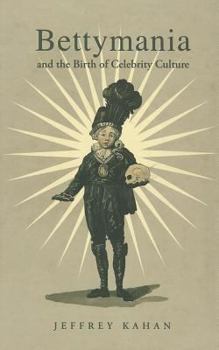Bettymania and the Birth of Celebrity Culture
In 1804, a kind of madness descended upon Britain. A thirteen-year-old boy, William-Henry West Betty, arrived and, in a seeming instant, took Ireland, Scotland, and England by storm. Crowds were so intent upon securing tickets for Betty's performances that officers were called out to stop rioters in the streets. Like the groupies who would a century and a half later mob Elvis or The Beatles, fans raved and regularly fainted when near "the divine Master Betty." The Caledonian Mercury reported that on Betty's first London appearance, the "screams of the females were very distressing, and several fainted away." The Morning Chronicle reported that during a performance of Betty's Romeo, "nearly thirty persons were pulled from the pit, in fainting fits." Even older, sophisticated men were strangely overcome by emotion by "Bettymania." When watching the boy perform, Drury Lane's manager R. B. Sheridan shed sighs, tears, and sobs; a similarly affected William Pitt, the Prime Minister of England, wept openly and uncontrollably. Professor Kahan's study is the first to link Bettymania to nineteenth-century consumerism: to point out that marketings of Bettymania in Ireland and Scotland differed radically; to argue that English Bettymania was a splintered rebuke of both King George III and Napoleon, to suggest that interest in Betty reflected the unique gender dynamics of early nineteenth-century Britain; to include a discussion of Betty's standing among the major Romantic poets; to survey Betty's later life; to detail the theatrical career of Betty's son, Henry Betty. Percy H. Fitzgerald, in his conversations with various members of The Garrick Club, recorded that the "Young Roscius was the only actor who ever knew exactly when to quit the stage." The truth is that Betty continued to play until virtually no audience in Britain remained interested in seeing him. However, the disintegration of Betty's popularity was not a sign of celebrity culture's failure but of its appropriate function. One idol must be replaced with another and another and another and another. A study of Bettymania may well offer us some insight into the emergence of celebrity culture and the means by which it continues to be fashioned and maintained.
Format:Hardcover
Language:English
ISBN:1611460697
ISBN13:9781611460698
Release Date:August 2010
Publisher:Lehigh University Press
Length:226 Pages
Weight:1.00 lbs.
Dimensions:0.7" x 6.0" x 9.5"
Customer Reviews
0 rating





